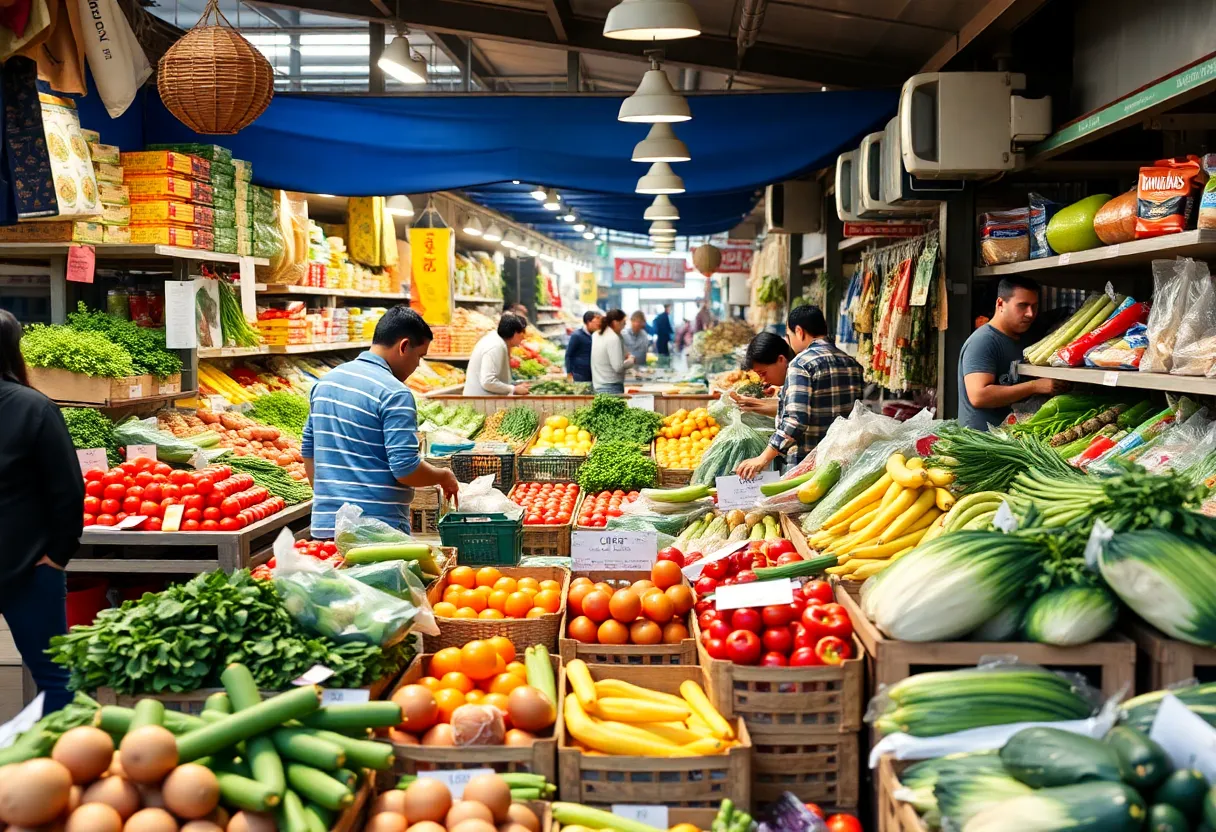Boston, October 10, 2025
News Summary
In response to rising food prices and food insecurity, Boston City Councilors Ruthzee Louijeune and Liz Breadon are proposing a hearing to explore publicly-owned grocery stores. The initiative aims to assess the feasibility of city-supported grocery operations that prioritize community benefits over profits, offering lower prices for lower-income residents. Amid rising food insecurity affecting 37% of Massachusetts households, the councilors seek to develop community-oriented solutions to enhance food access and potentially support existing nonprofit grocers in Boston.
Boston. Boston City Councilors Ruthzee Louijeune and Liz Breadon are proposing a hearing to explore the concept of publicly-owned grocery stores in response to rising food prices and food insecurity among residents. The proposal seeks to assess whether city-supported grocery operations could improve access to affordable, nutritious food for lower-income residents amid steep price increases and cuts to federal benefits.
What the proposal would examine
The initiative would study the feasibility, options, and potential impacts of municipally supported grocery stores. Boston City Councilors Ruthzee Louijeune and Liz Breadon are proposing a hearing to explore the concept of publicly-owned grocery stores in response to rising food prices and food insecurity among residents. The proposed city-run grocery stores could prioritize community benefits over profit, potentially offering lower prices and better food access. The proposal aims to create a supportive framework for existing nonprofit grocers and urban farming initiatives in Boston.
Context and drivers
An estimated 37% of Massachusetts households faced food insecurity in 2023, significantly up from 19% in 2019, according to the Greater Boston Food Bank. Louijeune and Breadon aim to increase food access for lower-income residents dealing with high grocery prices exacerbated by tariffs and inflation. Councilor Liz Breadon remarked on the urgency of the situation due to federal policy cuts impacting SNAP (food stamp) benefits.
Policy positioning and influences
The initiative was not influenced by New York City mayoral candidate Zohran Mamdani, who has similar proposals for city-run grocery stores. Boston Mayor Michelle Wu has not endorsed the proposal for city-owned grocery stores but acknowledged the pressing struggles families face to afford food. Louijeune emphasized the government’s role in supporting residents when the market fails, stating that government-subsidized grocers are not a new concept.
Community focus and alternatives
Proponents argue the effort would focus on developing community-oriented food access solutions instead of relying on existing corner stores and distant supermarkets. They noted the importance of developing community-oriented food access solutions instead of relying on existing corner stores and distant supermarkets. Examples of other cities with successful city-supported grocery stores include Atlanta and Madison, Wisconsin.
Concerns and potential downsides
Grocery industry expert Peter Brennan voiced concerns that city-owned stores might harm small businesses, stating they would be detrimental to local economies. The proposal is intended to weigh such trade-offs, including impacts on local corner stores, nonprofit grocers, and other private-sector food retailers.
Near-term actions and timeline
A hearing to discuss the feasibility and various options related to city-owned grocery stores could occur before the end of the year. The city council invites participation from the Mayor’s Office of Food Justice and community organizations for the proposed hearing. The hearing would also consider how a municipal approach could work alongside nonprofit grocers and urban farming efforts already operating in Boston.
Recent developments highlighting urgency
Daily Table, a nonprofit grocery chain in Boston, recently shut down due to high food prices and funding difficulties, highlighting the city’s food access challenges. Councilor Gabriela Coletta Zapata articulated that access to nutritious food should be treated as a basic human right, similar to housing. That line of argument has helped drive interest in exploring public models and other interventions to stabilize food access.
Next steps
The council’s hearing would assemble stakeholders, subject-matter experts, community organizations, and city agencies to map potential models, costs, benefits, and legal or operational constraints. The goal stated by sponsors is to determine whether a city-supported model could expand access, support community priorities, and complement existing food access programs while avoiding harm to local businesses.
FAQ
What are the councilors proposing?
Boston City Councilors Ruthzee Louijeune and Liz Breadon are proposing a hearing to explore the concept of publicly-owned grocery stores in response to rising food prices and food insecurity among residents.
Was the initiative influenced by a New York City mayoral candidate?
The initiative was not influenced by New York City mayoral candidate Zohran Mamdani, who has similar proposals for city-run grocery stores.
How widespread is food insecurity in Massachusetts?
An estimated 37% of Massachusetts households faced food insecurity in 2023, significantly up from 19% in 2019, according to the Greater Boston Food Bank.
What recent grocery closure highlighted the issue?
Daily Table, a nonprofit grocery chain in Boston, recently shut down due to high food prices and funding difficulties, highlighting the city’s food access challenges.
Has the mayor endorsed the proposal?
Boston Mayor Michelle Wu has not endorsed the proposal for city-owned grocery stores but acknowledged the pressing struggles families face to afford food.
When could the hearing take place?
A hearing to discuss the feasibility and various options related to city-owned grocery stores could occur before the end of the year.
Quick reference table
| Topic | Detail |
|---|---|
| Proposal | Boston City Councilors Ruthzee Louijeune and Liz Breadon are proposing a hearing to explore the concept of publicly-owned grocery stores in response to rising food prices and food insecurity among residents. |
| Food insecurity statistic | An estimated 37% of Massachusetts households faced food insecurity in 2023, significantly up from 19% in 2019, according to the Greater Boston Food Bank. |
| Recent closure | Daily Table, a nonprofit grocery chain in Boston, recently shut down due to high food prices and funding difficulties, highlighting the city’s food access challenges. |
| Timeline | A hearing to discuss the feasibility and various options related to city-owned grocery stores could occur before the end of the year. |
| Mayor’s position | Boston Mayor Michelle Wu has not endorsed the proposal for city-owned grocery stores but acknowledged the pressing struggles families face to afford food. |
| Other cities | Examples of other cities with successful city-supported grocery stores include Atlanta and Madison, Wisconsin. |
| Concerns | Grocery industry expert Peter Brennan voiced concerns that city-owned stores might harm small businesses, stating they would be detrimental to local economies. |
Deeper Dive: News & Info About This Topic
HERE Resources
Federal Government Shutdown Impacts Boston Services
Boston City Council to Explore Public Grocery Stores
Federal Shutdown Threat Looms Over Massachusetts
Market Basket Appoints Don Mulligan as Interim CEO
Vicente’s Supermarket to Launch First Location in Roxbury
Affordable Art Fair Debuts in Boston
Massachusetts Bay Transportation Authority Launches Low-Income Fare Program
Strike Looming for Safeway and Albertsons Workers in Colorado
Boston Faces Rising Restaurant Prices Amid Economic Challenges
Salmonella Outbreak Linked to Recalled Eggs Affects 79 People
Additional Resources
- Fox Business
- The Boston Globe
- CBS News
- NBC Boston
- Boston 25 News
- Wikipedia: Food insecurity
- Google Search: publicly-owned grocery stores
- Google Scholar: urban grocery stores
- Encyclopedia Britannica: food access
- Google News: Boston grocery stores

Author: STAFF HERE BOSTON WRITER
The BOSTON STAFF WRITER represents the experienced team at HEREBoston.com, your go-to source for actionable local news and information in Boston, Suffolk County, and beyond. Specializing in "news you can use," we cover essential topics like product reviews for personal and business needs, local business directories, politics, real estate trends, neighborhood insights, and state news affecting the area—with deep expertise drawn from years of dedicated reporting and strong community input, including local press releases and business updates. We deliver top reporting on high-value events such as Boston Marathon, Head of the Charles Regatta, and Boston Harborfest. Our coverage extends to key organizations like the Greater Boston Chamber of Commerce and Associated Industries of Massachusetts, plus leading businesses in finance, biotech, and insurance that power the local economy such as Fidelity Investments, Biogen, and Liberty Mutual Insurance. As part of the broader HERE network, we provide comprehensive, credible insights into Massachusetts's dynamic landscape.





